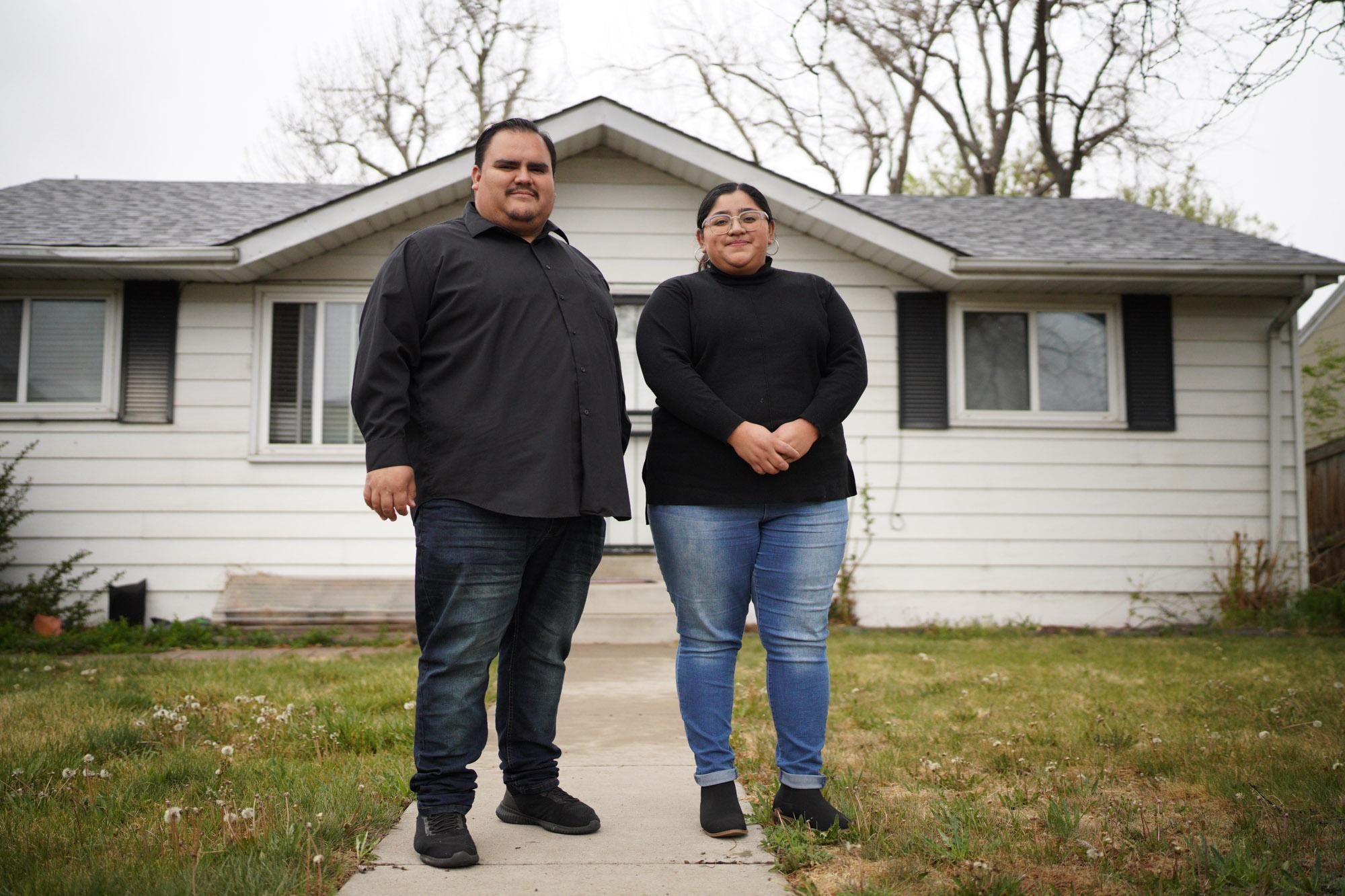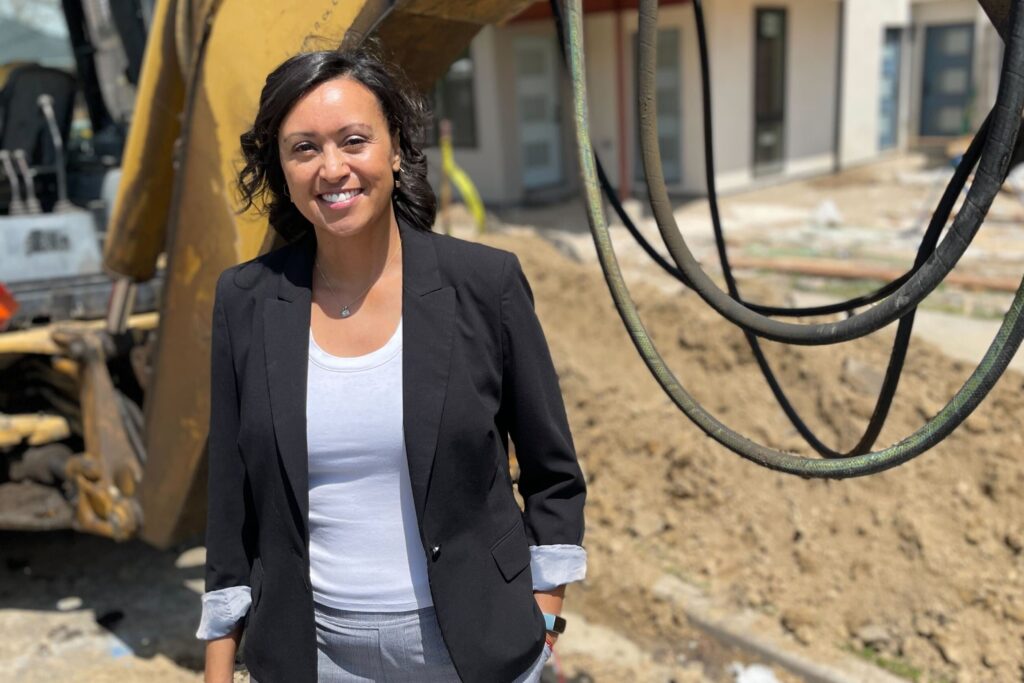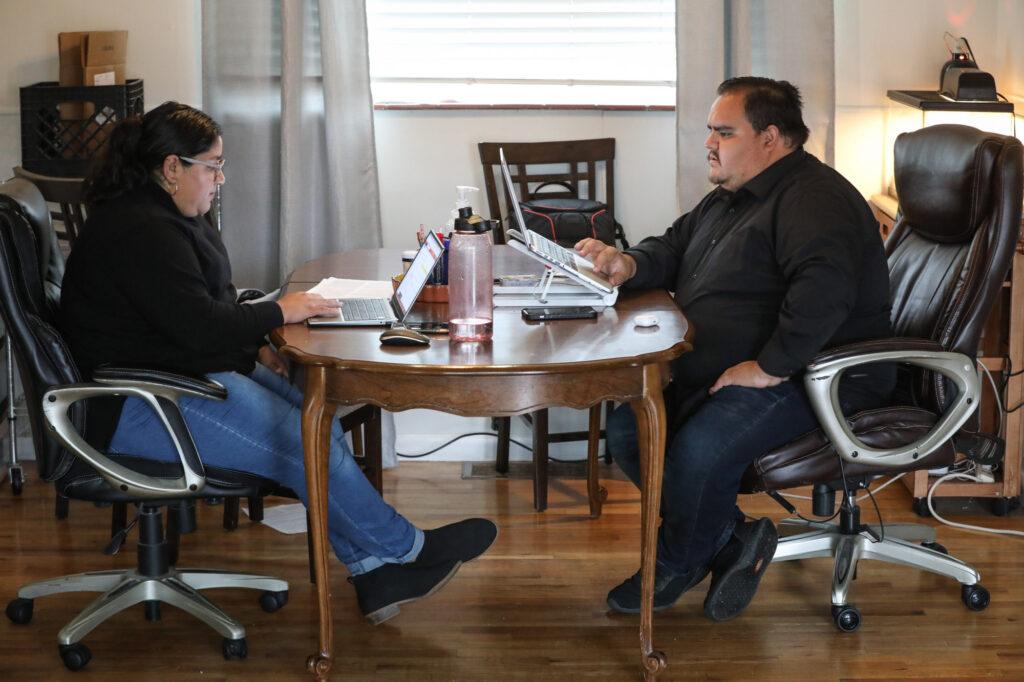
Brizai Gomez Cortes and Victor Galvan Ramirez have lived in Colorado since they were kids. Now, they want to buy their first home here.
“We’re both first-generation immigrants, and seeing the struggle our parents went through to get where they are — and us having conversations about having children — that was one of the biggest motivators,” said Gomez, who is 29.
When Gomez and Galvan started searching for a house last September, Galvan felt optimistic. The couple had the fun conversations of first-time homebuyers: did they want a garage or a yard, and how many bedrooms and bathrooms did they want their house to have? With their realtor, they went from home to home, falling in love with properties that had great locations or amenities.
Gomez and Galvan took calculated risks in their pursuit of buying a home and starting to build generational wealth. Gomez said she took money out of her retirement account to put towards a down payment. There were signs those risks would pay off.
“We had to prepare for an entire year just to consider asking for a loan. And when we were approved, we had this moment where we were so happy to be approved,” Galvan said, getting emotional. “That was a breakthrough for us.”
But the couple said that each time they put in an offer, it was turned down.
Like many homebuyers in Colorado in the last year, Galvan said they have competed with offers that are tens of thousands to a hundred thousand dollars over asking prices.
Slowly but surely, between September and February, Gomez and Galvan felt their optimism dissipate.
“It went from having hopes of a home that we really wanted to live in, to: I am willing to pay to be in any home. And it’s horrible to feel that way,” Galvan said.
When their last offer fell through, Galvan realized they needed to step back from the housing search for a while. He worried that they would end up spending their savings on a house that needed a ton of work, and would throw them into “financial ruin.” He thinks the housing market is “scary” because of the positions it can put potential homebuyers into.
“We both work around social justice issues. So, seeing the impact it has on our communities, and then living through that barrier of not being able to afford a home, too,” Gomez said. “It became a huge emotional burden. We decided to pause for our own mental health.”

Too many people, too few houses and lots of money
In the first three months of this year, home prices went up 20 percent compared to the first quarter of 2021, according to the multiple listing service REcolorado.
In Metro Denver, residential homes sold at a median price of $624,950 in April 2022, breaking the record set the previous month. Low inventory combined with lots of people who want to buy also means homes are not staying on the market long: the median was just four days in the first quarter of this year. Realtors who work in this market are seeing things that are unprecedented, in terms of the amount of cash — and risk — people need to make a winning bid on a home.
REcolorado found on average in March, buyers in Colorado paid six percent over list prices, or $36,000.
Owen McGrath told CPR News that he and his husband were able to buy a home recently, but they had to bid 25 percent over the asking price to have their offer accepted. They also had to expand their search to Louisville, a town different from the one they live in now. McGrath said he was shocked by “how little accuracy there is in the list price, given how aggressively people overbid due to the lack of supply.”
High prices mean higher down payments. On top of that, buyers have been offering to cover the gap between the sale price and the price at which a home appraises. That “appraisal gap” is another lump sum of cash the buyer pays up front.
Realtor Carrol Rhead with CJV Realty in Denver said buyers are giving up a lot right now, including waiving inspections or offering non-refundable earnest money.
“They’re basically giving any piece of cash that they have left to be able to step into a home,” Rhead said. “And I think that’s created a little bit of a danger situation for buyers. They’re stepping in and really going to be immediately cash poor possibly, but I think in the long term it sets them up to build that equity going forward.”
Ashley Cosgrove moved to Colorado about 10 years ago. She teaches at Overland High School in Aurora. She believes there is no such thing as a “starter home” anymore, and that as a teacher, she doesn’t make enough money to be able to buy, “which is really frustrating because I’m working in the community that I can’t even afford to live in,” she said.
There are several reasons for the lack of home inventory: construction has been low ever since the Great Recession when home building was seen as a riskier investment in the wake of the mortgage crisis. More recently, supply chain issues and labor shortages have further slowed down building, according to REcolorado.
The real estate service’s data shows that new listings are more likely to be in higher price ranges; there are more listings over $500,000 now than there were in 2021. Local opposition to individual housing projects stops some developments before they get started.
Meanwhile, the number of buyers has gone up. Like Cosgrove, lots of people have moved to Colorado in the past 10 years, and some came with significant money to spend after selling more expensive homes elsewhere. Low-interest rates in the pandemic encouraged people to buy. Some people entering the stage of life where they want to buy homes can get help from their parents to make down payments. Large and small investors have found opportunities in buying properties that may have traditionally been available as “starter homes.”

Assistance is available for would-be homebuyers in Colorado.
Realtors say Coloradans have to get creative to be able to buy in this market. There are numerous organizations that provide resources for homebuyers, particularly people who make below a certain income. Some, like the Colorado Housing and Finance Authority and metroDPA, offer loans for down payments or closing costs. The Dearfield Fund provides no-interest loans to Black and African American Denverites buying their first homes in the metro area.
A program called the Open Hand Initiative provided Valery Keys, a Navy veteran, with a grant to help her buy her first home. The grant helped her pay off old debts, which improved her credit enough that she could close on a home in December 2021. “I have a great kitchen with amazing stainless steel appliances,” she said. “It has a water softener, play areas, it’s just a dream come true.”
Owning is about more than those tangible things, though. “As a divorced single mom, I wanted to finally start earning equity,” Keys said.
For Keys, building that equity means achieving stability. “Part of the American dream is homeownership and owning land – having something that I can pass onto my children,” she said. “But more than that: showing my children [that] if I can do it, they can do it. Showing my children that this isn’t something that’s just for some people, that this is something for us.”
Cleo Lewis, a mortgage broker who helped found the Open Hand Initiative, said the program used all of its seed funding to give out five $5,000 grants in the past six months. The program is raising more money to fund another round of grants.
In the meantime, Lewis said buyers need to think outside the box to make their offers more competitive. That could mean using a down payment assistance program so saved money can toward paying for an appraisal gap.
“Or, what about combining housing with other people?” she said. “Maybe you don’t want to live with them forever, but just to get to the end result of homeownership.”
“There’s so much equity in properties in Colorado,” she continued. “Maybe you don't have access to a large down payment, but maybe one of your parents has equity in their property. Can they take a small home equity line of credit out to help you with your down payment or appraisal gap?”
Realtor Elizabeth Martinez with PorchLight Real Estate Group refers people to a local program called Accept.inc, a lender that Martinez said essentially buys a home for the buyer in cash, and then turns around and sells it to the buyer with more traditional financing. Cash offers are often more appealing to sellers, and Martinez said it has given clients a better chance to buy.
“In a traditional multi-offer situation, they wouldn’t be able to win with such a low payment down and little to no extra money to put towards this appraisal guarantee,” she said.
Realtors expect the price increases will level out, and they are already seeing signs.
Martinez has a term for what she has seen since the start of 2022: “piranha season.”
“We have more buyers than we have homes to sell them, so whenever a good house comes up, it’s like piranhas,” Martinez said, referring tongue-in-cheek to the omnivorous fish. “When they’re feeding like that — the buyers — the price goes up. And so we have intense price appreciation in these first months” of 2022. Martinez said the more traditional name for this behavior is a compression market, when the market gets squeezed by all the people wanting to buy.
There are signs that the compression market is loosening up. Summer traditionally brings out many more listings, just as buyers get busy with vacations and aren’t as eager to look for a home, said Martinez. “We’re seeing our seasonal shift right now,” she added.
But it’s not encouraging, yet, for Gomez and Galvan.
Galvan said the deck is stacked against buyers like them: people who don’t come from wealth or haven’t deliberately built credit throughout their lives. “It has been made clear to us how this is set up systemically to give access to rich people, and historically white people, and exclude folks that are coming in for the first time that don’t have access to large cash sums of money.”
The couple is now trying to amass more cash to be competitive.
“The game plan is to see what other side jobs we can do,” said Gomez. And “what other consulting we can do, to reach a good amount of money where we feel comfortable jumping in again.”








